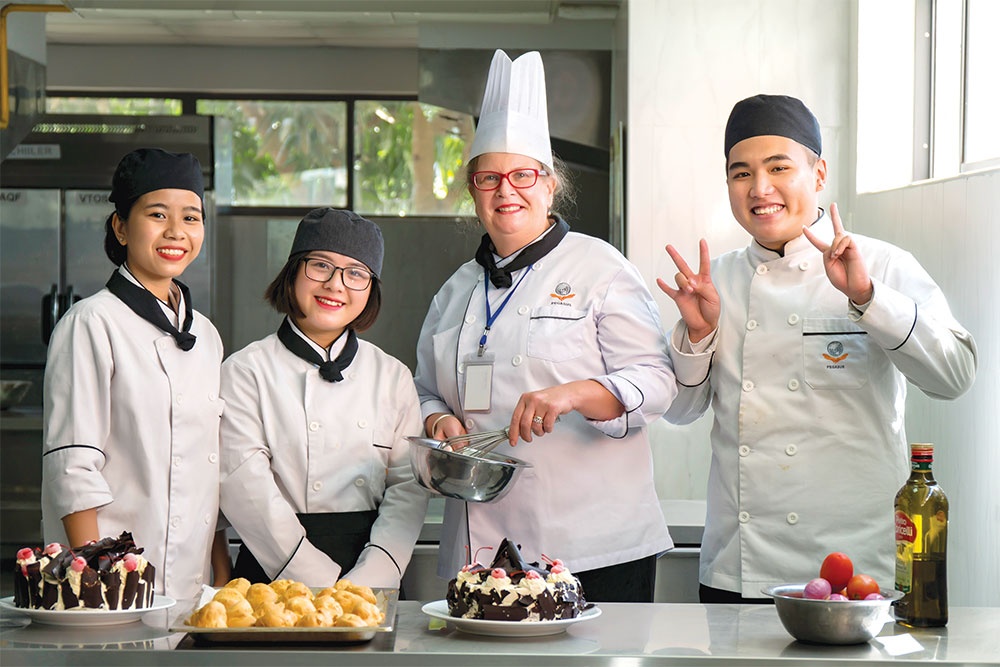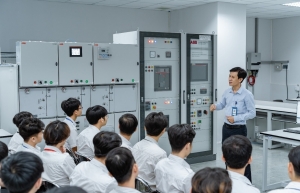College the answer for young people with practical skills
Today, colleges are placing a strong emphasis on training in accordance with market demands, in addition to collaborating with businesses to increase job opportunities for students – particularly for those professions where there is high demand in the labour market, such as the tourism and hotel industry in the post-pandemic era.
 |
Young people’s perceptions of colleges have improved as a result of their high level of pragmatism in training and ability to satisfy the majority of labour demands.
“I don’t think having a degree from a university is all that significant; what I need are professional knowledge and skills,” said 20-year-old Tran Minh Tri. “I decided to go to college in order to cut down on the amount of time I had to spend studying to get early practical experience and to begin working in business. Despite having enough points to enrol in a university, I have never regretted picking a college.”
According to the Directorate of Vocational Education and Training, the whole country enrolled over two million apprentices each year on average leading up to the pandemic, of which the college and intermediate levels accounted for 20-25 per cent and elementary level and other vocational training programmes accounted for the remainder.
There are many reasons why young people prefer to study at colleges. One is the fast-track training time, which enables students to graduate quickly and have immediate access to their dream professions. College students typically finish their education in roughly 2-3 years, whereas university students often finish in 4-5 years.
For a decade, Pegasus International College, established by KinderWorld International education group from Singapore, has been renowned for providing high-quality human resources training in a variety of sectors.
Along with important fields like hotel and hospitality management and culinary arts, Pegasus offers degrees in business administration, marketing, human resource management, and financial accounting.
Pegasus designs a training programme totally in accordance with quality standards and Australian government certifications with the goal of acting as a bridge for Vietnamese students to access the most advanced education available worldwide. Besides that, students in business programmes will complete their coursework fully in English and graduate with an internationally-recognised degree. Students will also be exposed to practice and perfect the key job skills.
Additionally, Pegasus students are assigned to do internships at renowned businesses, restaurants, and 5-star hotels in Vietnam while being personally advised by seasoned department heads.
In addition to having a curriculum that meets international standards and a team of dedicated instructors, Pegasus offers incredibly affordable tuition rates due to the shortened study schedule. Students can get a Vietnamese college degree or an equivalent from the United Kingdom or Australia in only a couple of years.
All Pegasus students who graduate will be given the opportunity to work for significant companies. For students who do not want to jump into work right away, Pegasus students may transfer to higher education levels in Vietnam or schools in Australia, the United States, Canada, Singapore, or the UK without having to complete any prerequisite courses.
Pegasus (www.pegasus.edu.vn) has announced enrollment of 10 majors and international-standard training certificates in accordance with English (BTEC), Australian (AQF), and Vietnamese degrees for 2022–2023. These include Hotel Management, Business Administration, Marketing, Finance and Accounting, Human Resource Management, Hospitality and Restaurants (Certificates II and III), Commercial Cookery (Certificate II), and also Kitchen Operation (Certificate II).
 | Young Vietnamese must grasp modern technical skills on offer The world around us is changing fast. One hears plenty about transformation, automation, AI, and “the great resignation”. All of this is speeding up, often as a side effect of the pandemic. These changes are having such an obvious impact on business, and they simply cannot be ignored. |
 | Cooperation between business and academia to foster Vietnamese students' skillsets The Industrial University of Ho Chi Minh City (IUH) recently launched the first Smart Grid Lab in Vietnam, which will give 350 students a year at the Electrical, Electronics, Control and Automation faculties the opportunity to build the skills they need to address the power network challenges of the future. |
What the stars mean:
★ Poor ★ ★ Promising ★★★ Good ★★★★ Very good ★★★★★ Exceptional
Related Contents
Latest News
More News
- Ho Chi Minh City launches plan for innovation and digital transformation (February 25, 2026 | 09:00)
- Vietnam sets ambitious dairy growth targets (February 24, 2026 | 18:00)
- Masan Consumer names new deputy CEO to drive foods and beverages growth (February 23, 2026 | 20:52)
- Myriad risks ahead, but ones Vietnam can confront (February 20, 2026 | 15:02)
- Vietnam making the leap into AI and semiconductors (February 20, 2026 | 09:37)
- Funding must be activated for semiconductor success (February 20, 2026 | 09:20)
- Resilience as new benchmark for smarter infrastructure (February 19, 2026 | 20:35)
- A golden time to shine within ASEAN (February 19, 2026 | 20:22)
- Vietnam’s pivotal year for advancing sustainability (February 19, 2026 | 08:44)
- Strengthening the core role of industry and trade (February 19, 2026 | 08:35)

 Tag:
Tag:




















 Mobile Version
Mobile Version